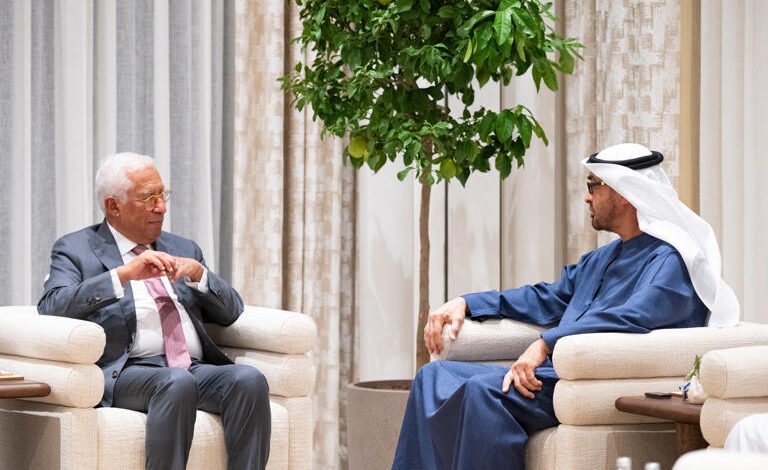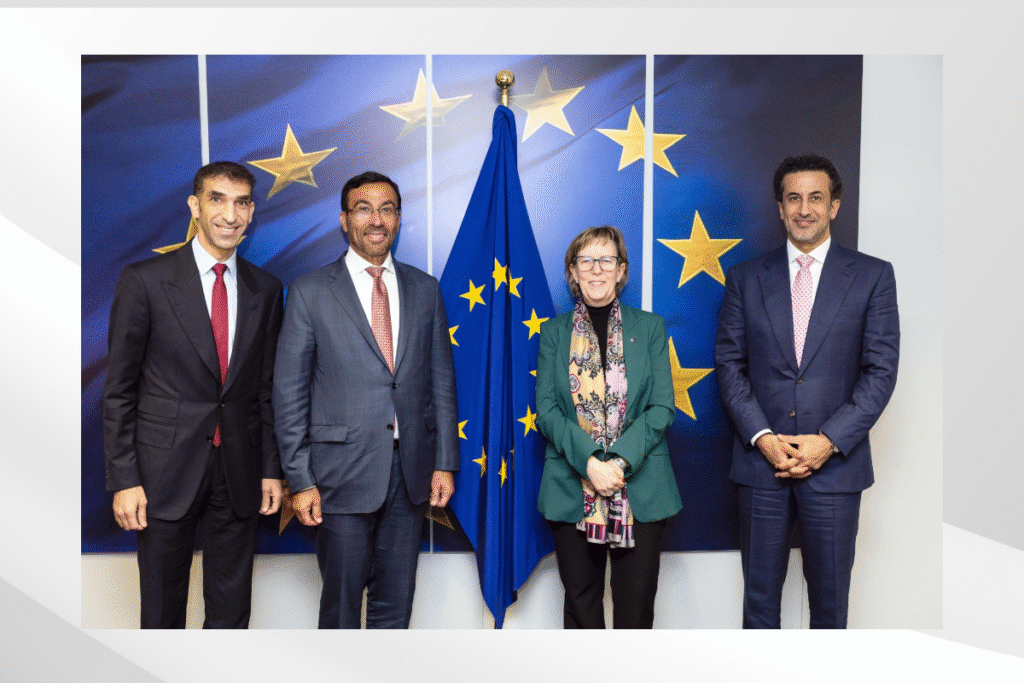
UAE Emerges as EU’s Strongest Middle East Trade Ally
The UAE and European Union’s non-oil trade has reached unprecedented levels, totaling $67.6 billion in 2024. This achievement makes the UAE one of Europe’s most important trading partners in the Middle East. The EU ranks as the UAE’s second-largest global trade partner, which shows the strong economic bonds between both regions.
Both parties have shown their steadfast dedication to strengthening economic ties through ongoing Free Trade Agreement (FTA) negotiations with the world’s largest economic bloc. They have completed three rounds of negotiations and scheduled the fourth round for next month. The partnership extends beyond trade and supports the UAE’s Vision 2031 and Net Zero 2050 Strategy. The UAE continues its vital role as an economic and logistical bridge that connects global markets between East and West.
EU Recognizes UAE as Strategic Trade Partner
“The European Union is a highly valued trade and investment partner for the UAE, with ties that continue to deepen across a range of sectors. This is evidenced not only by increasing trade exchanges but also through strategic collaboration in areas such as food security, energy transition and advanced technology.” — Dr. Thani Al Zeyoudi, UAE Minister of State for Foreign Trade
Antonio Costa, the European Council President, described the UAE-EU relationship as “strategic” and emphasized Abu Dhabi’s role as “an important and reliable partner for the EU in trade, security and global stability”. This official recognition makes the Emirates Europe’s strongest trade ally in the Middle East.
The economic bond between these regions grows stronger as the EU maintains its position as the UAE’s first investment partner. The financial ties run deep with mutual investments reaching €328 billion (AED 1405.84 billion). The EU now makes up 8.3% of the UAE’s total non-oil foreign trade, showing remarkable growth in bilateral trade.
Both sides stressed the value of current negotiations for a Comprehensive Economic Partnership Agreement during their high-level meetings. UAE Minister of State for Foreign Trade Dr. Thani Al Zeyoudi noted that this agreement “represents an extraordinary chance for us both to improve trade and investment ties that will encourage greater collaboration”.
The EU Commissioner for Trade and Economic Security Maroš Šefčovič reinforced this view: “Europe continues to be a reliable trading partner… it is natural to seek to grow our relations with long-standing and trusted partners like the United Arab Emirates”. Their steadfast dedication shows a relationship that increasingly features strategic collaboration and economic integration.
FTA Negotiations Signal Deeper Economic Integration
Image Source: Dreamstime.com
The UAE and European Union started formal negotiations for a complete Free Trade Agreement (FTA) in spring 2025. This followed key discussions between European Commission President Ursula von der Leyen and UAE President Sheik Mohamed bin Zayed Al Nahyan. The official launch took place on May 28, 2025, and the first major round began on June 24.
The agreement will reduce tariffs on goods and make services, digital trade, and investment flows easier. The plan includes strategic collaborations in vital economic sectors. These sectors range from renewable energy and green hydrogen to critical raw materials, artificial intelligence, advanced manufacturing, logistics, and healthcare.
UAE’s aggressive bilateral trade strategy continues with this agreement. The Emirates has actively pursued independent Comprehensive Economic Partnership Agreements (CEPAs) since 2021. They completed 26 such agreements by early 2025. These agreements showed remarkable results. The CEPA with India led to a 20.5% growth in bilateral trade, while UAE’s exports to India jumped by 75%.
This bilateral agreement could spark broader regional cooperation. EU officials see the UAE-EU FTA as “a building block toward a regional Free Trade Agreement” with the Gulf Cooperation Council. UAE Minister Al Zeyoudi shares this vision. He described the agreement as “a flow which is going to be starting from here and moving to the GCC”. The UAE serves as a gateway that connects Europe to markets representing half the world’s population.
Geopolitical Tensions Drive Strategic Cooperation

“Europe remains a reliable trade partner. It’s only natural to deepen our relationship with long-standing, trusted partners like the UAE. An ambitious bilateral agreement would unlock enormous opportunities for both European and Emirati businesses, delivering tangible, long-term benefits and greater predictability in trade.” — Maroš Šefčovič, European Commission Vice-President for Interinstitutional Relations and Foresight
Regional conflicts in the Middle East have created an unexpected bond between the EU and UAE. Their strategic interests aligned naturally as tensions grew throughout 2024-2025. Both partners found themselves agreeing on significant security matters, especially about Gaza and maritime threats in the Red Sea.
The UAE stands out as a key humanitarian force now. They provided 27% of all aid sent to Gaza. Their consistent stance against the “devastating war” and the “unjust blockade” has made an impact. EU officials acknowledged this contribution with praise: “The Emirates has played a very important role in providing humanitarian support to Gaza. Maybe the most effective support that anyone is providing”.
Security partnerships have grown stronger too. A Memorandum of Understanding signed in June 2025 created reliable infrastructure to share security and police information. This new system helps both sides communicate and exchange vital data more effectively.
The EU’s Operation Aspides, launched in February 2024, fights against Houthi attacks on commercial ships in the Red Sea. This naval effort shows their shared goal of protecting trade routes. EU officials noted that “the humanitarian situation in Gaza remains catastrophic” while praising “the UAE’s significant role in the provision of humanitarian assistance”.
These partnerships have become vital tools to tackle regional instability. Both the EU and UAE see their growing alliance as a way to promote broader diplomatic answers to complex Middle Eastern conflicts.
The UAE-EU partnership shows evidence of mutually beneficial diplomatic and economic relations that exceed traditional regional boundaries. Trade figures of $67.6 billion reflect the strategic value both sides place on their growing alliance. The UAE’s position as the EU’s strongest Middle East trade partner proves Abu Dhabi’s success as a vital link between Eastern and Western markets.
Current FTA negotiations show the clearest sign of commitment to deeper economic integration. Three completed rounds of talks, with a fourth one coming up, show good progress toward an agreement. This deal will cut tariffs and accelerate growth in vital sectors like renewable energy, green hydrogen, and artificial intelligence. Both regions will benefit from efficient trade processes, improved investment flows, and mutually beneficial alliances in new industries.
The partnership goes far beyond economics. The UAE has stepped up as a humanitarian leader during recent regional conflicts and built stronger security ties with European partners. Their shared stance on critical geopolitical issues builds stronger bilateral relations in challenging times. Their common interests in protecting key trade routes through initiatives like Operation Aspides show practical teamwork that helps global commerce.
Of course, this relationship looks set to grow further. The UAE and EU’s matching economic priorities, along with their shared vision for regional stability, point to a partnership that will grow stronger. The UAE’s work on Vision 2031 and Net Zero 2050 Strategy through collaboration with Europe brings tech and policy benefits. EU businesses also gain gateway access to growing markets across Asia and Africa.
The remarkable progress in UAE-EU relations sets an example for successful cross-regional partnerships. We have a long way to go, but we can build on this progress as their growing economic and strategic bonds show how shared interests bridge geographic and cultural gaps. This alliance between Europe and the Emirates builds a foundation for green prosperity that reaches far beyond their borders.






